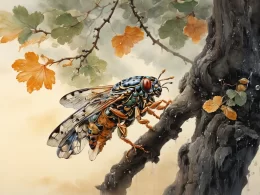Too young to have learned what sorrow means,
Attired for spring, she climbs to her high chamber....
The new green of the street-willows is wounding her heart --
Just for a title she sent him to war.
Original Poem:
「闺怨」
王昌龄
闺中少妇不知愁,春日凝妆上翠楼。
忽见陌头杨柳色,悔教夫婿觅封侯。
Interpretation
Composed during the High Tang period, this poem stands among Wang Changling's most renowned "boudoir plaint" works. In an era that glorified military achievement and frontier service, men pursued fame on distant battlefields while countless women waited in lonely seclusion. Against this social backdrop, the poem captures a young wife's abrupt transition from springtime delight to longing despair, revealing steel beneath its delicate surface through layered emotional development.
First Couplet: "闺中少妇不知愁,春日凝妆上翠楼。"
Guī zhōng shào fù bù zhī chóu, chūn rì níng zhuāng shàng cuì lóu.
"The young boudoir wife knows not grief's trace, / Adorns herself to view spring from jade tower's space."
The cheerful opening depicts an innocent woman yet untouched by life's sorrows. Her meticulous grooming and tower ascent seem carefree, yet the "unknowing" quality suggests subconscious displacement of melancholy—foreshadowing the coming emotional rupture.
Second Couplet: "忽见陌头杨柳色,悔教夫婿觅封侯。"
Hū jiàn mò tóu yáng liǔ sè, huǐ jiāo fū xù mì fēng hóu.
"Suddenly roadside willows' hue she spies, / Regrets urging her lord to seek marquisate's prize."
The pivotal "suddenly" unleashes a flood of emotion. Willows—traditional symbols of separation—trigger visceral longing. The agonized confession "regrets urging…" lays bare her awakened understanding of personal loss beneath societal glory, the violent mood swing exposing countless women's silent suffering behind Tang splendor.
Holistic Appreciation
While ostensibly a wife's plaint, the poem conceals sharp critique of feudal meritocracy beneath its graceful surface. In an age chanting "men should strive" and "seek glory afar," the poem reveals the domestic ruptures behind masculine ideals. Without directly stating grief, the willow's glimpse delivers emotional devastation. Its deceptively light diction carries profound resonance, making this a paradigm of the boudoir plaint genre.
Artistic Merits
- Joy-to-sorrow progression: The cosmetic preparation's cheerfulness intensifies the later anguish
- Scene-emotion alchemy: Willow color appears objectively yet triggers subjective turmoil
- Implicit social critique: Wifely regret subtly condemns militaristic values without direct accusation
- Economical profundity: Simple language conveys layered psychological and societal dimensions
Insights
The poem reminds us that visible glory often masks invisible costs. Through a wife's emotional awakening, Wang exposes the domestic tragedies underlying merit-seeking, demonstrating rare sensitivity to women's inner lives. Its enduring relevance challenges modern pursuits of external success at emotional expense, inviting reflection on companionship versus ambition's true price.
Poem translator
Kiang Kanghu
About the poet

Wang Changling (王昌龄), circa A.D. 690 - 756, was a native of Xi'an, Shaanxi Province. Wang Changling's poems were mostly about the Border Places, love affairs and farewells, and he was well known during his lifetime. His seven poems are equal to those of Li Bai, and he is known as the “Master of seven lines”.












